What is it?
A day long barista semi-crash course, set in a coffee shop, and with an optional SCAE accredited exam to complete at the end of it.
Probably best aimed at people with some experience working with commercial barista tools because you may want to put in some homework before you take your exam (I didn’t but I went anyway).
It will teach you how to make all manner of espresso with said equipment, as well as flat whites and lattes. You basically learn the staples of a commercial coffee shop.
Timing is 0930-1630, followed by optional exam. It can overrun a bit, though if you need extra time at the end for practice, they can probably hook you up on another date (bear in mind the shop closes at 17:30)
Who’s it suited to and why would you want to go?
Enthusiastic amateurs and coffee obsessives of all types who want to learn how to operate commercial coffee making equipment. Whether that’s working for yourself or for a shop, independent or not.
Anyone who wants an excuse to drink 7 espressos in about 7 minutes for ‘taste testing’. Do it once and then never do it again.
Sentient dolphins who can walk on land using their flippers (they want to learn about coffee, right?)
Where is it?
Artisan Coffee have a few locations but this one was at their lovely outlet on Ealing Broadway
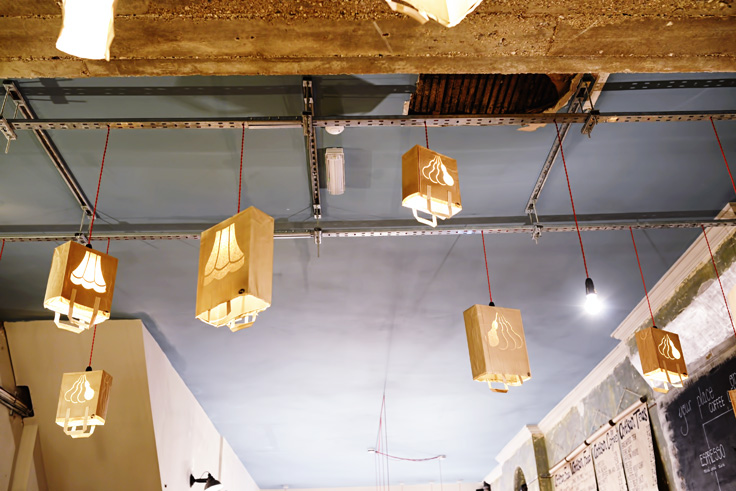
How much is it?
£190 without SCAE accreditation
£240 with SCAE accreditation
CoffeecoffeecoffeecoffeecoffeecoffeecoffeecoffeecoffeeFASTcoffeecoffeecoffeecoffeecoffee
Monday morning, the sun is shining. It’s a damn fine day to recalibrate your adrenals via the exciting medium of caffeine. And learn about the preparation and perpetuation of delicious specialty coffee
I arrive, ask for the artisan coffee school and am immediately offered a coffee. SPLENDID. This is how a good day could begin.
I arrive early, and finding a woman from Merseyside and a man from Pembrokeshire discussing business plans and festival experiences. Turns out that although I have arrived early I am the last one here and thus am technically early but also last. TAKE THAT, LOGIC.
So yeah, our group for the day is a trio – this is everybody. Turns out both of them are starting coffee related businesses and have come to learn how to operate their fancy machinery and all that useful stuff. It’s an intimate, personal setting – one trainer, 3 people.
At some point later I hear an amazing song the I can’t identify and want to Shazam but don’t because that would be a dick move and then the song ends and I am sad because I might not ever hear it again. Ever experienced that?
The Venue
Artisan Coffee opened its doors in back in 2011, with its first outlet in lovely Putney. They seem to have been going strong, opening their third outlet in August 2014, just off of Ealing Broadway.
The school, which is an extension of the coffee shop, was set up by Edwin and Magda Harrison, who arrived back in the UK after spending (and presumably meeting during) a year in Uganda. Edwin is English, whereas Magda is Australian (apparently a country also known for a fanatical dedication to ‘the world’s favourite beverage’). So it’s educational fun with small scale adrenal damage.
Artisan is a (very) active coffee shop with what is essentially a room that looks like a garage/DIY workshop. This is used for various functions. Currently it is being used as our classroom, and there is an array of coffee machines and grinders. It’s a pretty punk /’DIY aesthetic’ There are enough discarded coffee grounds on the floor to kill a Baleen Whale.
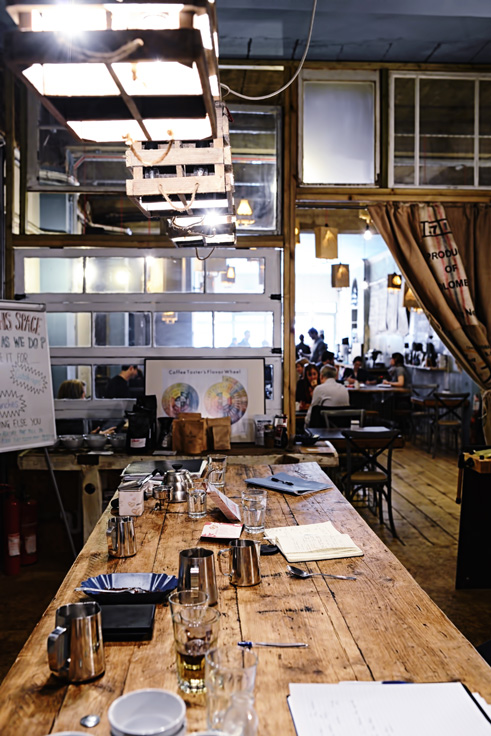
The great thing about here is that you get a schooling in coffee in a very non academic environment. It is a good feeling. As people here are often working on their laptops or catching up with friends, and our little group learning fits in entirely. At no point do you feel like ‘trainees’ or out of place.
The Trainer
Our trainer is Alessandro Bonuzzi (@alebonuzzi). He is from Verona and at first glance looks like some kind of Italian jazz prodigy. He was previously in the wine industry and uses a lot of wine metaphors to explain coffee tasting and varietals.
In between delivering technical info on grind permeability he will occasionally say great stuff like “If the internet works, we can watch videos on the internet!”. He was also the first ever SCAE registered professional barista, not just within the UK but within Europe, and so one can infer that he knows his shit.
He also pronounces ‘OK’ as ‘oh-kai’. He swears articulately for emphasis sometimes during demonstration. “And that’s how you keep that motherfucker in there, yeah”. The man is very patient and puts up with my incompetence/steep learning curve. It’s useful to have an Italian instructor to explain the differences between ‘espresso lungo’ ‘ristretto’, etc. He’s a great guy.
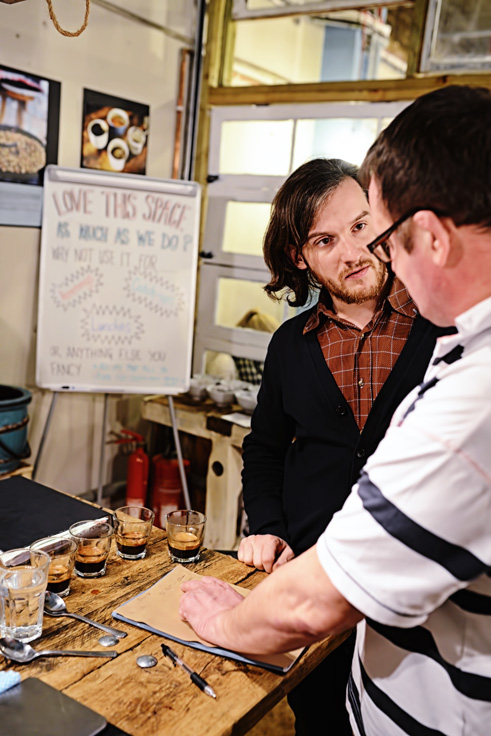
What’s the course like then?
From personal experience I can say that it is educational. It’s too early to say if it’s useful or not. The day is focused solely on espresso making technique, and like many courses – work is divided into ‘theory’ and ‘practical’.
Practical includes
Grinding – Grinding beans and finding the right grind density for the beans you’re using. Adjusting grounds to meet this density which results in coffee of a quality that makes your soul sing.
Milk – How to steam milk to the right temperature and consistency. How to pour a goddamn bodacious Latte/Flat White/Cappuccino. How to illustrate said bodacious milky coffee with via the medium of milk (despite how most baristas make it look, latte art is very…not easy)
Tasting – how to tell overextracted and underextracted coffees – from this it seems that many airlines (and I shall not name names) are underextracting their coffees. The more you know.
Cupping technique – I learn that you should approach the coffee from above and slurp upwards. Unlike a lot of food and drink related…’techniques’ – I feel like I get the hang of it pretty quickly. It does help you taste the coffee better but it slows the drinking process down quite substantially (imagine trying to drink coffee for the rest of your life by noisily slurring it off of a teaspoon)
Theory includes
The different types of coffee beans – What’s the difference between Arabica and Robusta, how can you tell, and why should you care?
How to ensure optimal extraction – The structure of the coffee bean, what the ‘golden cup ratio’ is, how extraction works – why coffee can over or underextract.
Store procedures – How to keep a coffee shop on the right side of health and safety laws, the differences in the needs of various customers (i.e why older people prefer their coffee hot), how to deal with catastrophic and calamitous events.
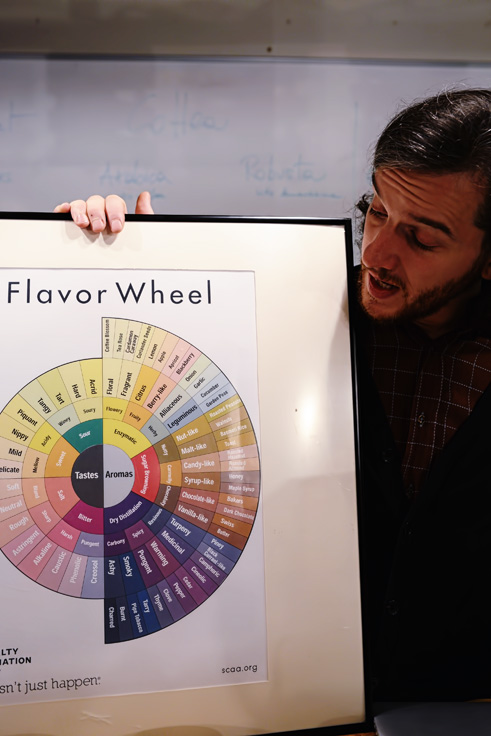
You are eventually split into groups to work. One person practices milk steaming and pouring, another works on grinding, and the third on the operation of the espresso machine. This means that you are essentially all working together, like on a shop floor – and such efficient operation is how I end up with my ‘1 espresso a minute experience’ – which is wonderful for about an hour but not wonderful for about a day after
Other stuff? Throughout the day a fair amount of time is spent smelling the inside of coffee bags, discussing the different characteristics that make up a coffee and Being A Coffee Basset Hound. Your sense of smell is one of your biggest assets.
The Verdict
If you’re the kind of person who goes on a barista training course, you’re either in the industry and need the qualification, or enthusiastic enough about coffee to go and study it off of your own back. In terms of pricing, £240 with accreditation is about average when compared to other course providers.
So it’s not a question of suitability, more a question of practicality and fun…
Practicality: Absolutely. You are going to get schooled and you are going to get schooled fast! You will likely need a bit more time if you haven’t had your own machine to practice on beforehand (or afterwards). This is a crash course, make no mistake. *motivational music* But if you study hard you shall not crash, you shall soar! *motivational music ends abruptly*
Fun: On the main part, it is. Things drag a little during the theory parts (but this is partly because I prefer to ‘learn by doing stuff’). You, however, may enjoy the practical much more – basically a remit to make unlimited cups of coffee, experiment with the variables, taste test everything and geek out of the art (and it is an art) of the barista.
As for the exam: The exam is pretty high pressure as, like many exams, you are working to a time limit and trying not to overthink all this new information swirling within your excited, excitable, caffeinated and somewhat overloaded head. What can I say? An exam is an exam, right?
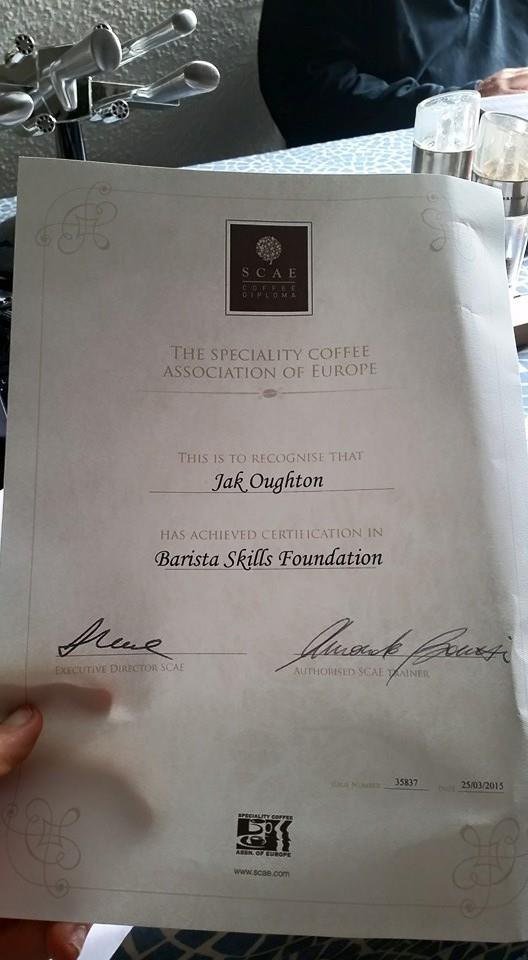
So, perhaps consider these things and see if it is for you.
More Info
http://www.artisancoffeeschool.co.uk/courses_items/barista-foundation/
….
